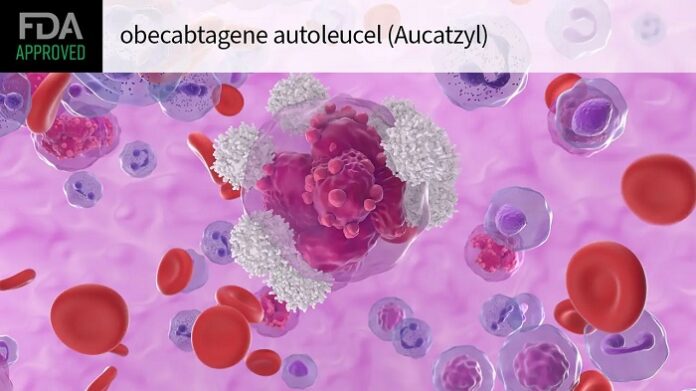The FDA has granted approval for obecabtagene autoleucel (obe-cel; Aucatzyl) as a treatment for relapsed or refractory B-cell precursor acute lymphoblastic leukemia (ALL) in adults, the agency announced on Friday.
Distinctively, unlike other CAR T-cell therapies, this CD19-targeted, genetically modified autologous T-cell immunotherapy will not require a Risk Evaluation and Mitigation Strategy (REMS) program.
As reported by medpagetoday, the approval was supported by the results of the single-arm, multicenter FELIX trial, which included patients with relapsed or refractory CD19-positive B-cell ALL.
Among 65 patients evaluated for efficacy, a single infusion of obe-cel led to a 42% complete remission (CR) rate at 3 months (95% CI 29-54), with responders experiencing a median CR duration of 14.1 months. Overall, 63% of participants achieved CR, including 12% with CR and incomplete hematologic recovery.
“Aucatzyl has shown significant effectiveness and can be managed safely, providing a strong risk-benefit profile for patients with B-ALL,” said Dr. Claire Roddie of the University College London Cancer Institute. “In the FELIX trial, Aucatzyl demonstrated long-term persistence and profound responses, both of which are critical for sustaining long-term remissions in B-ALL.”
Patients in the phase Ib/II trial had either relapsed after a remission lasting one year or less, experienced relapsed or refractory ALL after at least two previous therapies, or had disease that relapsed or was refractory three or more months following an allogeneic stem-cell transplant.
“Adult ALL is an aggressive cancer, and patients who relapse have historically faced poor outcomes, highlighting the urgent need for better treatment options,” noted Dr. Elias Jabbour of the University of Texas MD Anderson Cancer Center.
As with other CAR T-cell therapies, the drug’s label includes a boxed warning regarding the risks of cytokine release syndrome (CRS), immune effector cell-associated neurotoxicity syndrome (ICANS), and secondary T-cell malignancies. In the FELIX trial, 75% of patients experienced CRS (with 3% having grade 3 severity), while 24% developed ICANS (7% with grade ≥3). Neurologic toxicities were reported in 64% of patients, with 12% being grade ≥3.
Other frequently observed non-laboratory side effects, affecting 20% or more of participants, included infections, musculoskeletal pain, fever, nausea, diarrhea, febrile neutropenia, hypotension, pain, fatigue, headache, encephalopathy, and bleeding.























